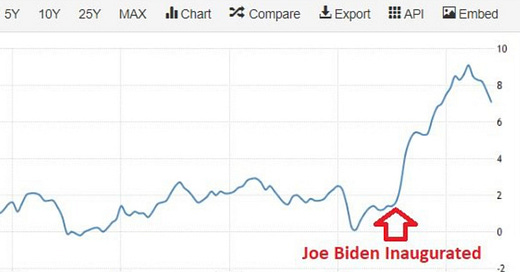Kamala Harris wants to persuade Americans that she’s got a plan to lower prices.
It’s the problem that’s the highest concern of Americans, so it should be Kamala’s highest priority.
It’s not. Even if it was, it wouldn’t work. And to make matters worse, she has persuaded many Americans that her plan will work. As they struggle to deal with higher prices in groceries and at the pump, they are being misled and given false hope. That’s cruel.
At a press conference (finally) last night and on her website, she insists that greedy corporations are jacking up prices for unconscionable higher profits. Hence, she will bring down prices by suing those nasty corporations.
Specifically, she’ll “call on Congress to pass the first-ever federal ban on price gouging….during times of crisis.”
That’s it. All fixed.
No details. No explanations. No follow-up to persuade the skeptics. Just trust me.
The problem with her single solution is that it accomplishes little, if anything.
Let’s start with the fact that grocery stores—her main target and the place where consumers confront inflation first hand—operate on razor-thing profits. One-to-two percent or lower is the typical profit margin for grocery store chains.
Let’s look at the largest chain—Kroger.
Its profit going back to 2010 is 0.22 percent, starting in 2010. For years the profit has hovered around 1.5 percent and sometimes lower. For the quarter ending last July it was 1.86 percent.
You could do better by stashing your money in those pathetically low-interest bank savings accounts. Or sticking your cash under your mattress.
As proof that Kamala’s legal crackdown on greedy stores will work, she lists four states that already have passed similar laws that force stores to lower their prices.
Okay, so let’s look.
TEXAS
The state sued business—a hotel and two gas stations. The hotel, for example, had been charging three times its normal rate during hurricane Harvey. “Several” of the lawsuits were settled when the companies agreed to refund customers.
My reaction: That’s nice for the customers of those businesses, but it didn’t do anything for shoppers in the nation’s groceries who still are paying the higher prices.
Next:
NORTH CAROLINA
“Since 2018, the North Carolina Department of Justice…has recovered more than $1 million for consumers by bringing 12 lawsuits against 29 defendants.”The result: “…14 judgments or settlements against 25 of the defendants, including a $274,000 settlement—the largest price gouging settlement in the state’s history."
My reaction: Big deal; $1 million in four years. Again, did it bring down prices throughout the system? No.
NEW YORK
An egg company was sued for raising the price of a dozen eggs to $1.49 from a range of 59 cents to $1.10 during the pandemic. The suit was settled, but it doesn’t say for how much. In another suit, after a baby formula recall, creating a shortage, a drug store chain was sued for selling more than 3,400 cans or bottles of baby formula at “unconscionably” high prices. The settlement resulted in a $50,000 payment and the donation of 9,564 formula cans to low-income and infant New Yorkers.
My reaction: So what? There’s no evidence that the action lowered prices throughout New York.
FLORIDA
The state sued three Florida motels for price gouging during Hurricane Matthew in 2016. And…? No results mentioned.
My reaction: And no apparent impact across the state.
To be fair, these lawsuits might motivate other chains across Florida to lower their prices. But without evidence, that’s doubtful.
Remember, the nation-wide law would be in effect only during emergencies, however they are defined. It doesn’t affect prices at all other times. Even though Kamala says on her website that is part of a three-point plan to bring down prices, implying for everyone.
Here are the other two parts of her “plan” as found on her website:
It will “invest in building resilient food supply chains.”…[I]t will focus on expanding production among new suppliers and small farms, growers, and processors to create broad-based supply chains.” We’re left to guess how her plans will to do that.
She “will revitalize competition in food and grocery prices, because a healthy and competitive marketplace means lower costs for consumers.” Additionally, “she will make sure the federal government has the resources to identify and take on anti-competitive practices in the food and grocery industries”. In other words, she’ll do this mainly by getting tougher on retail chain mergers and acquisitions. Meaning more government intervention in the free market.
There’s a lot of boilerplate there that we’ve heard before, mostly from the far-left. I’m not left breathless.
The problem is that her campaign against greed has left the impression that she’ll pull down prices for everyone everywhere and forever. It won’t. She doesn’t emphasize that the lawsuits only apply during crises.
Can’t go without explaining one other point Kamala and fellow Democrats constantly raise. She asserts that inflation “has significantly declined—with monthly grocery price inflation at or near 0 percent.”
No, no, no. Inflation hasn’t “declined” and certainly not “significantly.” This is a frequent Democratic trope. Inflation during the Biden years has increased prices more than 19 percent overall (the highest level in over 40 years) and 46 percent for gasoline. That 19 percent is baked into the economy and you’ll continue to pay it until the inflation rate goes negative.
In 2023 the average inflation rate 4.1 percent. Yes, the rate of the inflation has declined, but actual prices haven’t. Prices go down during a depression, but for now prices continue to increase, however so slightly.
Sadly, none of this will register with voters who only see and listen to the ads. And the media don’t bother to do the kind above analysis. Yes, democracy dies in darkness.





Democrats are the party of unintended consequences